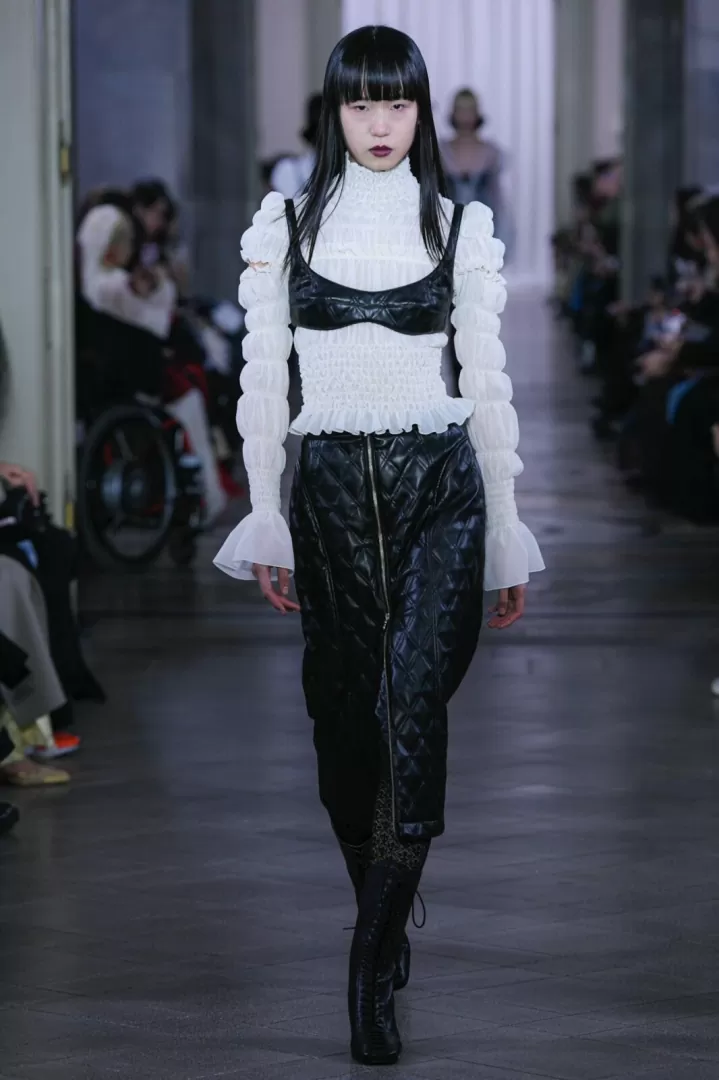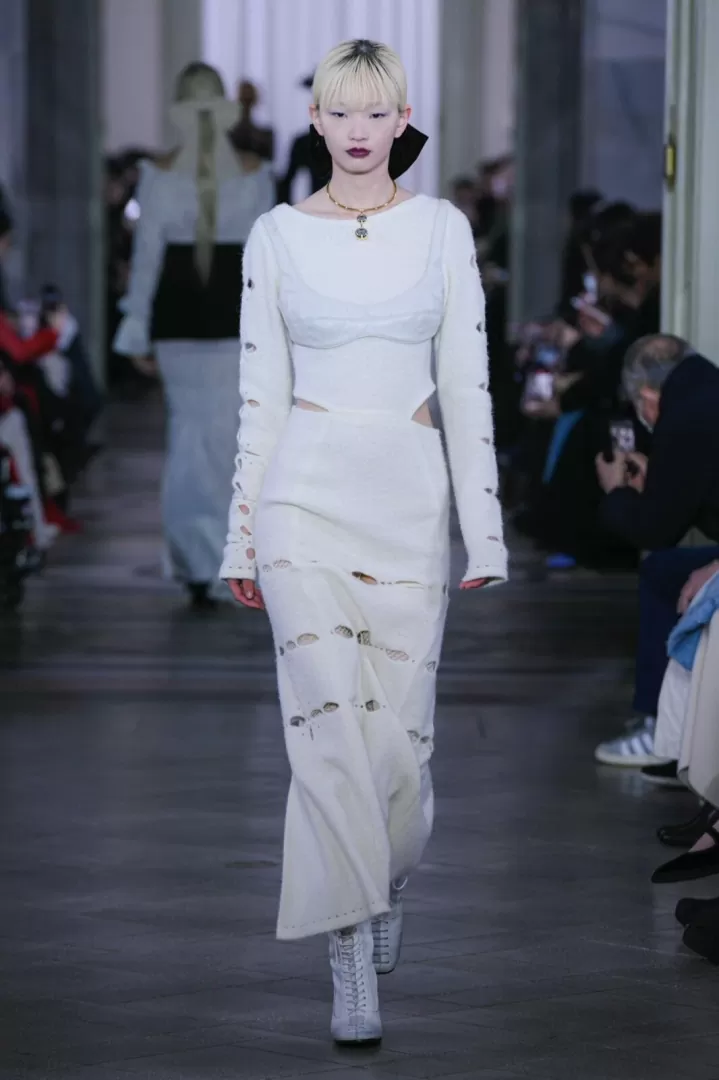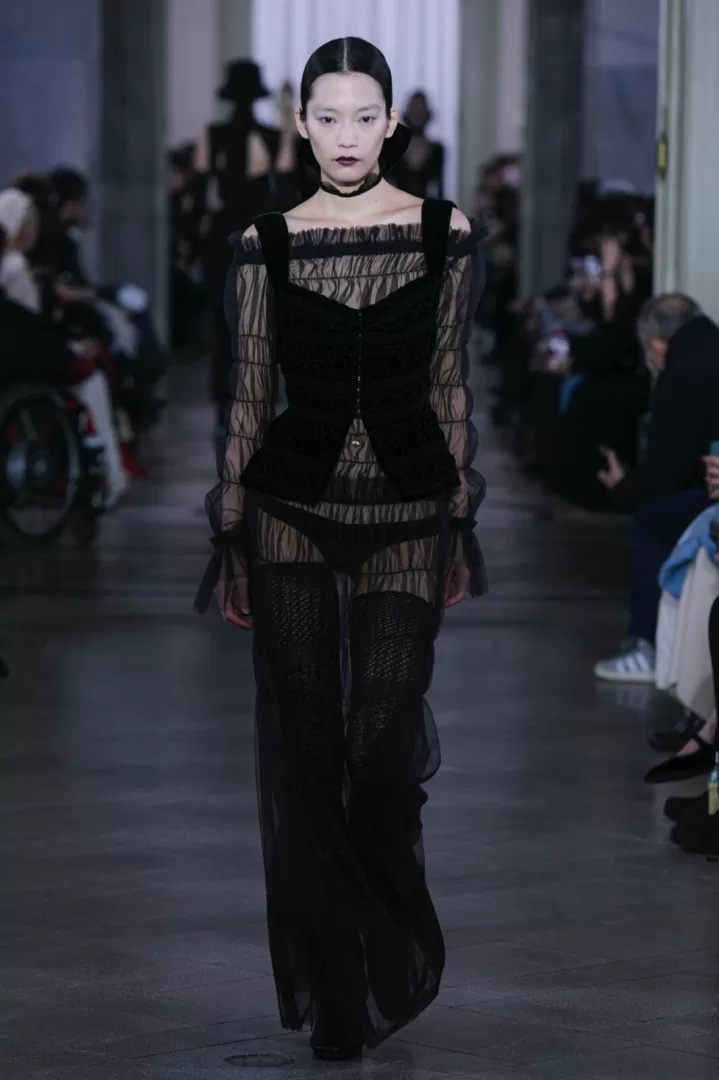EMI FUNAYAMA
- 5' ELEVEN''

- Aug 22, 2024
- 6 min read

In Japan there is a unique conception of “sexiness”. Historically, while the West emphasized the curved lines of a woman’s body with corsetry, Japan embraced the straight silhouette created by the kimono, which covers the entire body. Even today, the innocent and girlish cuteness favoured by Kawaii culture and J-Pop idols seems to garner more support than the mature sensuality exuded by adult women. In a society where the Yamato nadeshiko is a model for women and female behaviour with its emphasis on humility and modesty, skin-exposing and sexually accentuated clothing is not in high demand. Therefore most expressions of sensuality were not considered as an appealing characteristic for Japanese designers.
Words by Elie Inue. Portrait by Macky Mann.
Runway images from Autumn Winter 2024 Collection.
However, Fetico, which debuted with its Autumn Winter ’20/21 season, splendidly undercut such impressions. Based on body-conscious silhouettes that reveal the body’s lines, the brand utilizes sheer fabrics and cut-out techniques to bring out the inherent sensuality and strength of the wearer. While their concept is “The Figure: Feminine”, designer Emi Funayama explains, “We are not particularly conscious of a body-conscious style. What we want to express is the beauty of women’s forms. We aim to provide clothes that celebrate unique body shapes, allowing the wearer to feel beautiful in their own skin. Even when exposed, we aim for garments that maintain elegance and sophistication, conscious of expressing a refined sensuality that is uniquely Japanese.” In other words, what she creates are clothes for women to affirm themselves in, freed from not only the male gaze but also of any preconceived images of femininity.
From a young age, Funayama loved drawing clothes and pictures, and she had begun to quietly dream of becoming a designer ever since she was in middle school. Particularly influential were designers like Vivienne Westwood and Alexander McQueen, and who may be seen in her current creations. After graduating from high school in Japan, she went to Marangoni London School to study design. “When I was 18, I was deeply impressed by the exhibition of the Japanese photographer Nobuyoshi Araki that I saw in London. The photographs exuded sensuality, regardless of the subject. I’m not consciously pursuing sensuality now, but I feel that sense of beauty within me, and I feel like I’ve been naturally influenced,” she reflects.
After studying abroad, Funayama studied at Esmod Japon in Tokyo and worked as both a costume designer and a designer at a major boutique followed by honing her skills at Christian Dada before she went on hiatus in January 2020. After years of preparing to create a brand, two months later in March 2020, she launched Fetico. Early on, Fetico attracted the attention of fashion magazine editors, stylists, and niche mode lovers, and her name recognition increased dramatically when she participated in Rakuten Fashion Week Tokyo and held a show after winning the JFW NEXT BRAND AWARD 2023 and the TOKYO FASHION AWARD 2023.
With a strong commitment to original fabrics, including wool from Ojiya, the largest woollen textile production area in Japan, and knits from Niigata, which inherited artisan techniques as part of its history, about 90 per cent of the production is made in Japan. Currently, she is aiming to expand sales overseas with clothing made in Japan that utilizes the technology of delicate craftsmanship, and draws on a textile heritage known for its excellent feel, smoothness and softness. Emi Funayama concludes, “The current challenge is to adapt to the overseas market with size variations and to increase bags, and shoes launched a few seasons ago, [so that we are] proposing a total styling. We want to grow into a brand that attracts attention from other countries.” The day when Fetico, a brand by women for women, empowers women around the world, doesn’t seem too far away.
Discover this piece inside the Japan Chapter at The Silk Road Issue 12
Purchase your copy here.
JAPANESE VERSION
日本には独特の“色気”の概念がある。かつて西洋で、コルセットを使って女性の体の曲線的なラインを強調することが美しいとされていた時代も、日本では体全体を覆う着物による直線的なシルエットが市民権を得ていた。カワイイ文化やJ-Popアイドルからは、大人の女性が漂わせる色気よりも、純粋無垢な少女っぽい可憐さの方が現在も支持を集めるのが見て取れる。謙虚で奥ゆかしい大和撫子が女性にとっての模範であった日本で、肌を露出して性的な側面を押し出した装いは需要が高くなかったうえに、日本人デザイナーにとって色気の表現は得意ではない印象だ。しかし、そんなイメージを見事に覆したのが、2020-21年秋冬シーズンにデビューしたFeticoである。体のラインを露わにしたボディコンシャスのシルエットを基盤に、透け感のある素材やカットアウトの技法を多用して、着用者に内在する色気と強さを引き出す洋服を打ち出す。“The Figure : Feminine(その姿、女性的)”をコンセプトに掲げるが、デザイナーの舟山瑛美氏は、「ボディコンシャスなスタイルを特別意識しているわけではない」と話す。「表現したいのは、女性の造形美。肌の見せ方をデザインするということを念頭に置き、個々に異なるユニークな体型を称え、着用者が自分自身を美しいと感じられる洋服を提供したいと思っています。露出していても品があり、洗練された、日本人らしい官能性の表現を意識しています」と続けた。つまり彼女が作るのは、男性からの視線や既存の女性像を取り除いた、女性が自分自身を肯定するための洋服。
幼少期に、洋服と絵を描くのが大好きだった彼女は、中学生の頃から漠然とデザイナーの夢を抱き始めた。特に影響を受けたのが、Vivienne WestwoodやAlexander McQueenといったデザイナーであることも、現在のクリエーションに影響を与えているのかもしれない。日本の高校を卒業後、マランゴーニ学院ロンドン校へと進学するため渡英。「18歳の時にロンドンで見た写真家・荒木経惟の個展で、日本らしい色気の表現に感銘を受けました。被写体が何であれ、滲み出るような官能性が漂う写真。今も色気を意識しているわけではありませんが、それを美しいと感じる感覚が私の中にあり、自然と影響を受けたような気がします」と振り返る。
留学後は東京のエスモードジャポンで学び、衣装デザインや大手セレクトショップでのデザイナーを経て、2020年1月に休止したChristian Dadaで技術を磨いた。ブランド創設のために長年準備を進めていた彼女は、Christian Dadaの休止2ヶ月後の2020年3月にFeticoをローンチ。早々にファッション誌の編集者やスタイリスト、ニッチなモードラバーから注目され、JFW NEXT BRAND AWARD 2023とTOKYO FASHION AWARD2023の受賞を機に楽天ファッションウィーク東京に参加してショーを行うと、その知名度は一気に高まった。
国内最大の毛織物の産地、尾州のウールや、歴史とともに職人技術を受け継ぐ新潟のニットなど、90%を日本国内で生産したオリジナルの生地にも強いこだわりを持つ。現在は、肌触りが良く滑らかで柔らかい、繊細なものづくりの技術を活かした日本生産の洋服を携えて、海外での販路拡大を目指す。舟山氏は、「海外の市場に適応するサイズ展開と、数シーズン前にスタートさせたバッグとシューズのバリエーションを増やし、トータルのスタイリングで提案するのが今の挑戦です。他国からも注目してもらえるブランドへと成長していきたい」と展望を語った。女性による女性のためのFeticoが、世界中の女性をエンパワーする日はそう遠くなさそうだ。











Comments